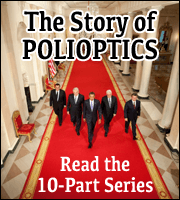Ben White, Matt Zeitlin and Tim Carney are our guests this week.
With guest host: New School Professor and former Missouri Senator Jeff Smith
Show produced by Katherine Caperton.
Original Air Date: October 5, 2013 on SiriusXM “POTUS” Channel 124.
PoliOptics airs regularly on POTUS on Saturdays at 6 am, 12 noon and 6 pm.
Follow us on Twitter @Polioptics
Listen to the show by clicking on the bar above.
Show also available for download on Apple iTunes by clicking here
Hi – I’m Jeff Smith, public policy professor at The New School in New York City, sitting in for Josh this week – a week full of political intrigue. Between Senator Ted Cruz’s theatrics, the government shutdown, the Obamacare rollout, and the looming debt ceiling, there’s a lot to talk about – and the standoff also raises intriguing questions about party alignment. This week we hosted three reporters who’ve been in the thick of it, Politico’s Ben White, Buzzfeed’s Matt Zeitlin, and the Washington Examiner’s Tim Carney.
* * *
Few political science concepts have been as heatedly debated in academia (and in journalism, to a lesser degree) as the term “realignment.” Some scholars argue that party realignments happen in a single election; others say they take decades. Some define realignment as a durable shift in the voting behavior of certain groups, while others stress elite-level policy shifts. During realignments, a “rare, massive, and enduring shift of the electoral equilibrium” occurs, and while some suggest that realignment occurs through mobilization of new groups or generational replacement, others stress actual partisan conversion in the electorate. Whatever the cause, the shift profoundly alters party coalitions and the relative strength of various factions within them.
ealignments typically occur when the dominant issue cleavage in a political system is disturbed by a new set of issues leading to widespread public demand for action. Given a two-dimensional issue space – imagine economic issues on one axis and cultural issues on the other – the minority party will naturally attempt to shift the focus of political debate to issues which will help it divide the other party’s coalition and attract more voters – which is what Republicans are attempting to do by focusing on Obamacare, which unites Republicans but splits Democrats from Democratic-leaning independents. Repeated iterations of such attempts by political parties may gradually produce a rotational movement of party realignment over time in a two-dimensional space. Such rotation helps explain why the 2000 electoral map was almost the mirror image of the 1896 map: it wasn’t that electorates in Nebraska and Manhattan traded their world-views and economic interests over decades; it was that in many respects, the two parties traded places. A realignment, then, comprises two elements: 1) a newly dominant issue cleavage and 2) a transformation not of political preferences generally but of the way that people holding those preferences align by party.
And so, although this week’s show mostly focuses on the shutdown and debt limit default, we also raise broader questions about how these battles may affect party alignment. For instance, does Wall Street’s alignment with the president against the Tea Party portend a broader switch of allegiances to a pro-business Democratic party under the banner of Wall Street-backed Hillary Clinton versus a populist Ted Cruz or Fed-auditing Rand Paul? Or might the emergence of a Clinton candidacy buoyed by Wall Street bundlers inspire a Warren-esque anti-financier insurgency that attracts elements sympathetic to both Occupy and anti-bailout libertarians – particularly if Wall Street-backed Chris Christie is the Republican standard-bearer?
This week, Polioptics fans get to hear three whip-smart young journalists – Politico’s Ben White, Buzzfeed’s Matt Zeitlin, and the Washington Examiner’s Tim Carney – delve into all of this and more. Matt and Ben explain the shutdown’s economic impact and the financial implications of default – globally, and locally – with an eye towards possible shifts in party alignment that might result from Washington’s current battles. And Tim takes a deep dive into the future of the Republican Party – and the conservative movement more broadly. Three unique perspectives not just on today’s news, but on tomorrow’s…and perhaps next year’s as well.


Leave a Reply